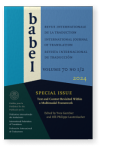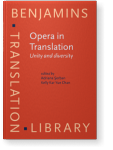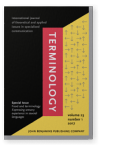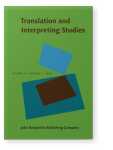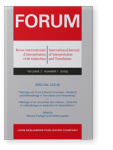M. Carmen África Vidal Claramonte
List of John Benjamins publications for which M. Carmen África Vidal Claramonte plays a role.
2024 Images that translate Text and Context Revisited Within a Multimodal Framework, Gambier, Yves and Olli Philippe Lautenbacher (eds.), pp. 234–250 | Article
The connection between translation and contemporary art is a hitherto under-researched avenue. Some scholars have analyzed the translation of exhibition catalogue essays (Krein-Kühle 2021) or the museum as a translation site (Sturge 2007; Neather 2008, 2012, 2021; Liao 2018, 2021). Although… read more
2020 Fluid borders: From Carmen to The Car Man. Bourne’s ballet in the light of post-translation Opera in Translation: Unity and diversity, Şerban, Adriana and Kelly Kar Yue Chan (eds.), pp. 95–115 | Chapter
This paper takes Matthew Bourne’s The Car Man as an example of today’s enlarged definition of translation, following Maria Tymoczko’s, Susan Bassnett’s, Edwin Gentzler’s and other, new post-positivist approaches to contemporary translation. Bourne’s post-translation offers an up-to-date version… read more
2017 Food terminology as a system of cultural communication Food and terminology: Expressing sensory experience in several languages, Temmerman, Rita and Danièle Dubois (eds.), pp. 155–179 | Article
In this study on food terminology and culture, Frame-based Terminology Theory (FBT) (Faber 2012, 2015) was combined with corpus analysis to explore the use of culture-specific terms in the food categories of bread and rice. For the sake of comparison, semplates (Levinson and Burenhult 2009;… read more
2016 On the noises and rhythms of translation Translation and Interpreting Studies 11:2, pp. 131–151 | Article
In the global society of the twenty-first century, language plays a fundamental role that is neither neutral nor innocent. The meaning of every word is never pure, but it is charged with many different noises and rhythms according to the culture in which they originate. As a result, the most… read more
2009 Translation as an Ethical Action Ideology and Cross-Cultural Encounters - Research and Methodology in Translation and Interpreting / Idéologie et les rencontres des cultures - recherche et méthodologie en traduction et interprétation, pp. 155–169 | Article
Les changements sociétaires du vingtième siècle ont créé ce que Zygmunt Barman appelle des temps liquides caractérisés par la richesse de l’hybridité et les problèmes qui en découlent. Aujourd’hui tout particulièrement la traduction est appréhendée comme un acte idéologique. Face à la… read more
